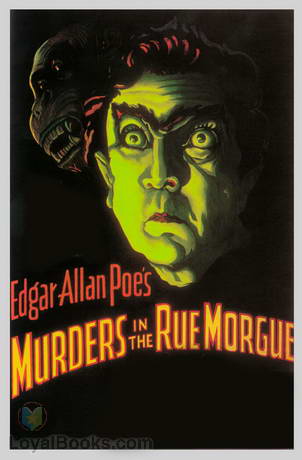
This story opens with a mother and daughter found brutally murdered inside a locked room in an upstairs apartment on a street in Paris. The police are baffled by both the ferocity of the crime and the lack of clues. Neighbors give conflicting evidence. Two friends are intrigued by the entire situation as reported in the newspapers. They decide to do a little investigating on their own. What they come up with is one of the most shocking and strangest of conclusions.
The Murders in the Rue Morgue by Edgar Allan Poe is perhaps the first modern detective tale, though similar stories by Voltaire and ETA Hoffman did appear a few decades earlier. It was published in Graham’s Magazine in 1841.
One of the interesting aspects of Poe’s story is that it sets the tone for future detective stories. Many of the elements found in Rue Morgue… went on to become the established canon of detective fiction. For instance, the idea of a “locked room” was taken up by other writers to include long-distance, non-stop trains, remote islands, a house cut off from neighbors by snow, floods, rain and other such ideas. Another idea that this story generated was that of suspicion being thrown equally on a number of people. The amateur sleuth is usually drawn into the case by a friend. Finally, the detective comes up with a solution that could have been apparent to everyone, but only he or she is able to put the facts together in the most logical way. These ideas are all contained in The Murders in the Rue Morgue, making it the forerunner of great detective stories featuring fictitious crime solvers like Sherlock Holmes, Hercule Poirot, Miss Marple, Father Brown, Nero Wolfe and a host of others.
One of Poe’s biographers declares that this story changed the history of world literature. It was received with great enthusiasm and commercial success. It has also been adapted several times for radio, film, stage, television and comic books. The sleuth C. Auguste Dupin featured in two more stories: The Mystery of Marie Roget, and The Purloined Letter. He became the prototype of the brilliant, eccentric detective who solves mysteries that the police are unable to.
The story was also one of the first of Poe’s works to be translated into French and was published in a Parisian newspaper, though Poe was not noted as the author and many of the locations and characters were changed. When another French paper featured the story, a sensational trial followed, which finally brought Poe’s name into the limelight!
Indeed a great addition to your whodunit collection!

Other Audiobook
Audiobook: Critique of Practical Reason
The Critique of Practical Reason (Kritik der praktischen Vernunft) is the second of Immanuel Kant’s
Audiobook: Epistulae Morales Selectae
Seneca is an important repository of Stoic doctrine. His reputation, based on the ancient testimony,
Audiobook: Still – William
More humorous adventures (1925) by the world’s most misunderstood English boy. – Summary by david
Audiobook: Páginas Recolhidas
Páginas Recolhidas é um livro de contos de Machado de Assis, lançado em 1899. A
Audiobook: The Concept of Nature
In The Concept of Nature, Alfred North Whitehead discusses the interrelatedness of time, space, and
Audiobook: Stille Kracht
De stille kracht (1900) is een boek van de Nederlandse schrijver Louis Couperus. Het behoort
Audiobook: Adventskalender 2016
Diese Sammlung ist ein Adventskalender und enthält für jeden Tag vom 1. bis 24. Dezember
Audiobook: Ben, the Luggage Boy; or, Among the Wharves (version 2)
A young boy named Ben runs away to make a life of his own in
Audiobook: Outdoor Girls on Pine Island
In this 7th volume of the “Outdoor Girls” series, the girls spend the summer in
Audiobook: Aesthetic as Science of Expression and General Linguistic
One of the earliest works of this Italian philosopher and literary critic, Aesthetic as Science
Audiobook: Lives and Opinions of Eminent Philosophers, Book VI
There are 10 divisions in this title. This project is a recording of book 6.
Audiobook: The Prospective Mother
A Handbook for Women During Pregnancy. This book, written for women who have no special